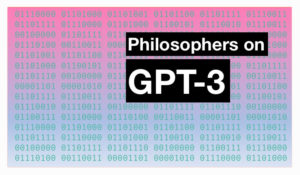Philosophers On GPT-3 (updated with replies by GPT-3)
(PhilNote: TLTR!!! 26 pages at 13pt font)
 Nine philosophers explore the various issues and questions raised by the newly released language model, GPT-3, in this edition of Philosophers On, guest edited by Annette Zimmermann.
Nine philosophers explore the various issues and questions raised by the newly released language model, GPT-3, in this edition of Philosophers On, guest edited by Annette Zimmermann.
Introduction
Annette Zimmermann, guest editor
GPT-3, a powerful, 175 billion parameter language model developed recently by OpenAI, has been galvanizing public debate and controversy. As the MIT Technology Review puts it: “OpenAI’s new language generator GPT-3 is shockingly good—and completely mindless”. Parts of the technology community hope (and fear) that GPT-3 could brings us one step closer to the hypothetical future possibility of human-like, highly sophisticated artificial general intelligence (AGI). Meanwhile, others (including OpenAI’s own CEO) have critiqued claims about GPT-3’s ostensible proximity to AGI, arguing that they are vastly overstated.
Why the hype? As is turns out, GPT-3 is unlike other natural language processing (NLP) systems, the latter of which often struggle with what comes comparatively easily to humans: performing entirely new language tasks based on a few simple instructions and examples. Instead, NLP systems usually have to be pre-trained on a large corpus of text, and then fine-tuned in order to successfully perform a specifictask. GPT-3, by contrast, does not require fine tuning of this kind: it seems to be able to perform a whole range of tasks reasonably well, from producing fiction, poetry, and press releases to functioning code, and from music, jokes, and technical manuals, to “news articles which human evaluators have difficulty distinguishing from articles written by humans”.
The Philosophers On series contains group posts on issues of current interest, with the aim being to show what the careful thinking characteristic of philosophers (and occasionally scholars in related fields) can bring to popular ongoing conversations. Contributors present not fully worked out position papers but rather brief thoughts that can serve as prompts for further reflection and discussion.
The contributors to this installment of “Philosophers On” are Amanda Askell (Research Scientist, OpenAI), David Chalmers (Professor of Philosophy, New York University), Justin Khoo (Associate Professor of Philosophy, Massachusetts Institute of Technology), Carlos Montemayor (Professor of Philosophy, San Francisco State University), C. Thi Nguyen (Associate Professor of Philosophy, University of Utah), Regina Rini (Canada Research Chair in Philosophy of Moral and Social Cognition, York University), Henry Shevlin (Research Associate, Leverhulme Centre for the Future of Intelligence, University of Cambridge), Shannon Vallor (Baillie Gifford Chair in the Ethics of Data and Artificial Intelligence, University of Edinburgh), and Annette Zimmermann (Permanent Lecturer in Philosophy, University of York, and Technology & Human Rights Fellow, Harvard University).
By drawing on their respective research interests in the philosophy of mind, ethics and political philosophy, epistemology, aesthetics, the philosophy of language, and other philosophical subfields, the contributors explore a wide range of themes in the philosophy of AI: how does GPT-3 actually work? Can AI be truly conscious—and will machines ever be able to ‘understand’? Does the ability to generate ‘speech’ imply communicative ability? Can AI be creative? How does technology like GPT-3 interact with the social world, in all its messy, unjust complexity? How might AI and machine learning transform the distribution of power in society, our political discourse, our personal relationships, and our aesthetic experiences? What role does language play for machine ‘intelligence’? All things considered, how worried, and how optimistic, should we be about the potential impact of GPT-3 and similar technological systems?
See the full article here: https://dailynous.com/2020/07/30/philosophers-gpt-3/
Pages
- About Philip Lelyveld
- Mark and Addie Lelyveld Biographies
- Presentations and articles
- Tufts Alumni Bio